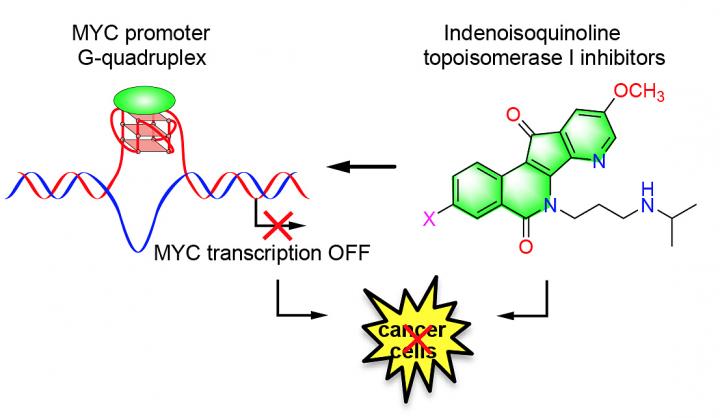
IMAGE: Purdue University researchers have discovered potential anticancer agents that stabilize the MYC promoter G-quadruplex and downregulate the expression of the MYC oncogene. view more
WEST LAFAYETTE, Ind. – A gene called MYC has become one of the hottest targets for cancer researchers around the world. MYC is known to drive tumor growth in nearly all cancer types – but successfully targeting the gene has proven to be a challenge. One that has been baffling researchers for more than three decades.
Now, researchers at Purdue University have discovered a novel set of MYC promoter G-quadruplex stabilizers that have demonstrated anticancer activity in human cancer cell cultures. The discovery is published in the July 8 edition of the Journal of the American Chemical Society.
“We are striving to discover effective anticancer agents,” said Mark Cushman, a distinguished professor of medicinal chemistry in Purdue’s College of Pharmacy, who helps lead the research team. “The ability to incorporate MYC promoter G-quadruplex stabilizing activity into existing topoisomerase I inhibitors has shown promise in making them more potent as anticancer agents and in making cancer cells less likely to become resistant to them.”
The Purdue team discovered potential anticancer agents that target the MYC promoter G-quadruplex and downregulate the expression of the MYC oncogene, which is overexpressed in cancer and is associated with almost all aspects of cancer development. The work has been supported by the National Cancer Institute and the National Institutes of Health.
Cushman, whose cancer research work contributed to his election as a fellow of the National Academy of Inventors, said they discovered a novel class of indenoisoquinoline MYC promoter G-quadruplex stabilizers in collaboration with Danzhou Yang. Some of them also inhibit topoisomerase I, an enzyme that facilitates DNA replication and is produced in greater amounts in cancer cells.
“Targeting promoter G-quadruplexes offers a relatively new and exciting strategy to inhibit the critical oncogene expression in cancer cells,” said Yang, the Martha and Fred Borch Chair of Cancer Therapeutics in Purdue’s College of Pharmacy, who led the research with Cushman. “We hope to combine the potency of the DNA-targeted drugs and selectivity of molecular-targeted approaches for new cancer therapeutics.”
Yang and Cushman, both members of the Purdue University Center for Cancer Research, said the agents they discovered could be used in helping to treat nearly every type of cancer. Some of the technology from their work has been licensed to Gibson Oncology LLC through the Purdue Research Foundation Office of Technology Commercialization.
Some of the work Cushman and his team previously developed led to three anticancer agents that are in clinical trials. The MYC innovation will greatly enhance interest in these anticancer agents within the scientific community and will also contribute to the understanding of how they work.
###
The work aligns with Purdue’s Giant Leaps celebration, acknowledging the university’s global advancements in health as part of Purdue’s 150th anniversary. This is one of the four themes of the yearlong celebration’s Ideas Festival, designed to showcase Purdue as an intellectual center solving real-world issues.
About Purdue Research Foundation Office of Technology Commercialization
The Purdue Research Foundation Office of Technology Commercialization operates one of the most comprehensive technology transfer programs among leading research universities in the U.S. Services provided by this office support the economic development initiatives of Purdue University and benefit the university’s academic activities through commercializing, licensing and protecting Purdue intellectual property. The office is managed by the Purdue Research Foundation, which received the 2016 Innovation and Economic Prosperity Universities Award for Innovation from the Association of Public and Land-grant Universities. For more information on licensing a Purdue innovation, contact the Office of Technology Commercialization at otcip@prf.org. For more information about funding and investment opportunities in startups based on a Purdue innovation, contact the Purdue Foundry at foundry@prf.org.The Purdue Research Foundation is a private, nonprofit foundation created to advance the mission of Purdue University.
About Purdue University Center for Cancer Research
The Purdue University Center for Cancer Research brings together the best minds from within Purdue University and beyond to study cancers where they start — inside the cell. Using the combined expertise of scientists from disciplines as varied as engineering and veterinary medicine, biology, and chemistry, the Center for Cancer Research promotes discovery into how cancers develop, progress and respond to treatment. The work leads to the advancement of new medicines, early detection and diagnostic methods, more effective treatments, and highly efficient drug delivery systems.
Writer: Chris Adam, 765-588-3341, cladam@prf.org
Source: Mark Cushman, cushman@purdue.edu
Danzhou Yang, yangdz@purdue.edu
Disclaimer: AAAS and EurekAlert! are not responsible for the accuracy of news releases posted to EurekAlert! by contributing institutions or for the use of any information through the EurekAlert system.

